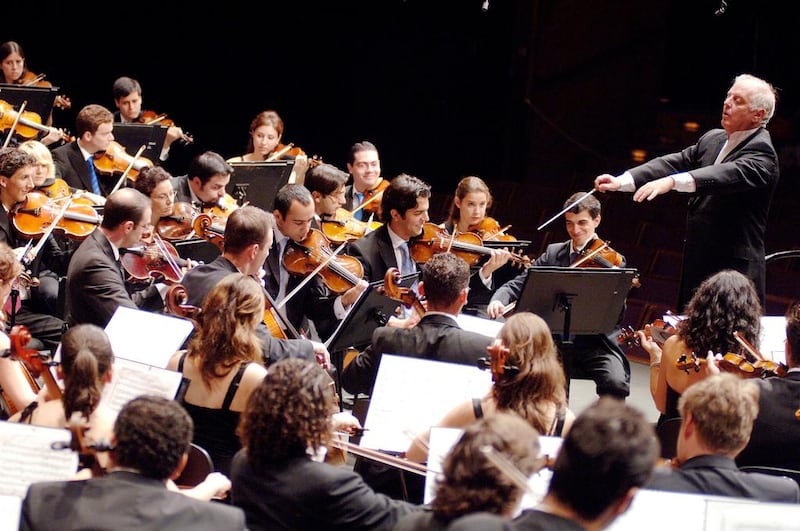It was in 2005 when Daniel Barenboim was conducting the West-Eastern Divan Orchestra in Ramallah that he truly saw the message of peace and unity they were promoting.
That concert, he says, was important for the 15-year-old orchestra as well as for Palestinians.
Since then, their attempts to promote constructive dialogue in conflict zones in the Middle East have been thwarted, but he believes the concert in Abu Dhabi tonight will resume efforts in that direction.
“When we played in Ramallah, we went there in solidarity with the Palestinian people,” says the Israeli-Argentine virtuoso.
“The concert in Ramallah remains for me the high point in the history of the orchestra,” says the 71-year-old Barenboim, who last performed in the capital in 2011. “Unfortunately, because of the political situation in the region, the orchestra is not able to play in countries that are represented in it. This is also a reason why we are honoured to come to Abu Dhabi because it is part of the region.”
Barenboim teamed up with the late Palestinian-American scholar Edward Said in 1999 to create an orchestra in Weimar, Germany, that would accept talented young musicians from all over the Middle East to demonstrate a model of solidarity that could be emulated by other countries. They named the ensemble after a series of poems by the German writer Goethe. More than 85 musicians from countries including Egypt, Syria, Iran, Israel, the Palestinian Territories, Jordan and Lebanon met in Spain to attend workshops and rehearsals, which resulted in an international concert tour.
“The orchestra only attracts musicians who have this double interest,” he says. “They represent the highest quality in music-making, completely and totally uncompromising, not depending on nationality or gender, with particular sensibilities to their country and the desire to make a personal contribution.”
He says the audience needs to remember the orchestra do not have a political agenda.
“We are not political,” he emphasises. “We have a complete consensus on the music and we have many different opinions on the political situation. But each musician treats the narration of the other with utmost respect. They try to be curious and see the legitimacy of the views of others.”
He says differences of opinion are welcome through healthy discussions and music. “The musicians play together, which means they ‘dialogue’ together,” he says.
“They listen to one voice, which is the principal voice; the other is the instrument they play. The fact is that music is all-encompassing,” says Barenboim, who made his international debut as a pianist in 1952. “It is not about one thing. It is about different things, different elements, sometimes even opposing elements in permanent dialogue. This is the message of the orchestra.”
Doubts have been raised on whether the orchestra have wavered from the path they set out on and if members show a commitment beyond their professional aspirations.
But Barenboim says their goal is intact.
“Our voices and music have not drowned,” he says.
“There are so many aspects of justice and equality of rights for everybody that have not been achieved. But in the orchestra, all musicians are equal; they have the same rights and responsibilities. So, if you look at it positively, it is a good example of what we imagine life could be on the ground.
“The Middle East is in a deadlock at the moment. It isn’t a conflict that can be resolved militarily or politically. It is a human conflict between two peoples who are deeply convinced they have the right to live on the same piece of land, preferably exclusively. And that is why the conflict is not being solved because it is not being treated as a human conflict.”
In Abu Dhabi, the orchestra will be playing the classics: Sinfonia concertante in E flat major by Mozart, a violin and viola solo with the orchestra, and Beethoven’s Symphony No 7 in A major.
“Beethoven has been the thread through the 15 years of the orchestra and we performed it first in 1999. Since then, we have played it at all our concerts,” says Barenboim.
Zaki Anwar Nusseibeh, the deputy chairman of Abu Dhabi Tourism and Culture Authority, which has organised the concert, says the show will combine musical excellence and a humanitarian message.
“Daniel Barenboim is appreciated both for his skills as a leading conductor and also because of his efforts to create understanding between cultures and civilisation,” says Nusseibeh. “He has a vision that matches that of our founding fathers.”
Nusseibeh believes music has the ability to eliminate differences. “Music is undoubtedly a universal language – transnational and translinguistic. You do not need a special vocal knowledge to appreciate it. The kind of cooperation that comes from these young players, not only in presentation of a concert, but coming together to practise, makes us see what is not more common – the commonality of interest among people.”
• Daniel Barenboim and the West-Eastern Divan Orchestra perform at Emirates Palace tonight at 8pm. For registration and ticket information, call 02 657 5800
[ aahmed@thenational.ae ]





